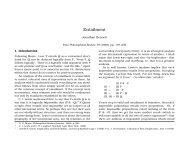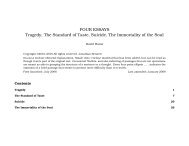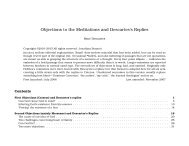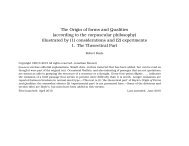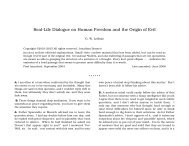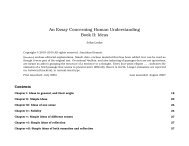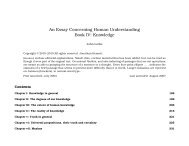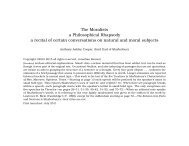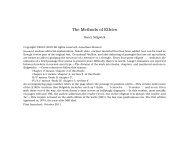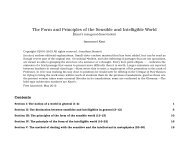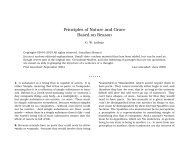A Vindication of the Rights of Woman with - Early Modern Texts
A Vindication of the Rights of Woman with - Early Modern Texts
A Vindication of the Rights of Woman with - Early Modern Texts
Create successful ePaper yourself
Turn your PDF publications into a flip-book with our unique Google optimized e-Paper software.
The <strong>Rights</strong> <strong>of</strong> <strong>Woman</strong> Mary Wollstonecraft 4: The degradation <strong>of</strong> woman<br />
from society, and by one error torn from all those affections<br />
and relationships that improve <strong>the</strong> heart and mind. In<br />
many cases it doesn’t even deserve to be called an ‘error’;<br />
because many innocent girls become <strong>the</strong> dupes <strong>of</strong> a sincere<br />
affectionate heart, and even more girls are—to put it<br />
vigorously—ruined before <strong>the</strong>y know <strong>the</strong> difference between<br />
virtue and vice. Their education has prepared <strong>the</strong>m to<br />
become infamous, and that is exactly what <strong>the</strong>y do. Refuges<br />
and shelters are not <strong>the</strong> proper remedies for <strong>the</strong>se abuses.<br />
what <strong>the</strong> world is short <strong>of</strong> is not charity but justice!<br />
A woman who has lost her honour imagines that she can’t<br />
fall any lower, and as for recovering her former status—that<br />
is impossible; no exertion can wash away this stain. Losing<br />
thus every motivation, and having no o<strong>the</strong>r means <strong>of</strong> support,<br />
prostitution becomes her only refuge, and her character<br />
is quickly depraved by circumstances over which <strong>the</strong> poor<br />
wretch has little power unless she is uncommonly intelligent<br />
and high-spirited. Necessity never makes prostitution <strong>the</strong><br />
business <strong>of</strong> men’s lives, but countless women are rendered<br />
systematically vicious in this way. But this arises largely<br />
from <strong>the</strong> state <strong>of</strong> idleness in which women are educated—<br />
always taught to look up to man for maintenance, and to<br />
consider <strong>the</strong>ir persons [see Glossary] as <strong>the</strong> proper payment<br />
for his exertions to support <strong>the</strong>m. . . . It is usually thought<br />
that when chastity is lost everything worthy <strong>of</strong> respect in a<br />
woman is lost. Her character depends on one virtue, but <strong>the</strong><br />
only passion fostered in her heart is love.<br />
Indeed, a woman’s honour is not even made to depend<br />
on her will. When ·in his novel Clarissa· Richardson makes<br />
Clarissa tell Lovelace that ·by raping her· he has robbed her<br />
<strong>of</strong> her honour, he must have strange notions <strong>of</strong> honour and<br />
virtue. The condition <strong>of</strong> someone who could be degraded<br />
<strong>with</strong>out his or her [see Glossary] own consent is miserable<br />
beyond all names <strong>of</strong> misery!. . . .<br />
49<br />
Most <strong>of</strong> life’s evils arise from a desire for present enjoyment<br />
that gallops out <strong>of</strong> control. The obedience required <strong>of</strong><br />
women in <strong>the</strong> marriage state comes under this description.<br />
[That is verbatim MW: she presumably means that a wife’s obedience<br />
consists in reining in her desires for present enjoyment.] A mind that<br />
is naturally weakened by depending on authority never exerts<br />
its own powers, so that <strong>the</strong> obedient wife is turned into a<br />
weak, idle mo<strong>the</strong>r. And even if this doesn’t happen, ·<strong>the</strong>re<br />
is a different kind <strong>of</strong> moral degradation inherent in this<br />
situation·. When only negative virtues are cultivated, almost<br />
no thought is given to a future state <strong>of</strong> existence, ·i.e. to<br />
life after death·. Writers on morals, especially when writing<br />
about women, have too <strong>of</strong>ten considered virtue in a very<br />
limited way, basing it solely on what will produce benefits in<br />
this life; indeed, <strong>the</strong> stupendous structure that is virtue has<br />
been given an even more fragile base, in that <strong>the</strong> wayward<br />
fluctuating feelings <strong>of</strong> men have been made <strong>the</strong> standard <strong>of</strong><br />
virtue.. . . .<br />
[MW writes now about <strong>the</strong> ‘vain absurdities ’ <strong>of</strong> men<br />
who degrade <strong>the</strong> sex that <strong>the</strong>y claim is <strong>the</strong> source <strong>of</strong> <strong>the</strong>ir<br />
chief pleasure. She targets men who—turning away from<br />
prostitutes ei<strong>the</strong>r because <strong>the</strong>y •prudently want to avoid<br />
diseases or because <strong>the</strong>y •are worn out from all <strong>the</strong>ir uses <strong>of</strong><br />
prostitutes—get married in order to have ‘a safe companion’,<br />
viewing <strong>the</strong>ir wives (MW implies) as merely safer and more<br />
convenient prostitutes.]<br />
Love considered as an animal appetite can’t feed on itself<br />
for long <strong>with</strong>out dying. This extinction in its own flame could<br />
be called <strong>the</strong> violent death <strong>of</strong> love. But a wife who has been<br />
made licentious in this way will probably try to fill <strong>the</strong> void<br />
left by <strong>the</strong> loss <strong>of</strong> her husband’s attentions; because after<br />
being treated like a goddess she won’t settle for becoming<br />
merely an upper servant. She is still handsome, and instead<br />
<strong>of</strong> transferring her fondness to her children she only dreams



